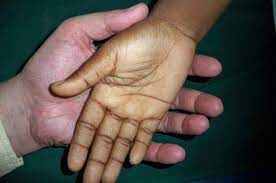This is a condition in which the number of red blood cells or the haemoglobin within the red blood cells is lower than normal. This lack of enough healthy red blood cells leads to the inability of the blood to carry adequate oxygen to the body tissues.
Anaemia is a serious global public health problem in which young children and pregnant women are specifically affected. According to an estimate by the World Health Organisation (WHO), 42% of children less than 5years of age and 40% of pregnant women are anaemic.
The 3 major causes of anaemia are bleeding, low production of red blood cells and high rate of red blood cell destruction. There are several types of anaemia.
Aplastic anaemia is due to infections, certain medications, autoimmune diseases and exposure to toxic chemicals. Iron deficiency anaemia is a result of iron shortage, cancer, blood loss, ulcer and certain medications. Sickle Cell Anaemia is due to the irregular shape of red blood cells. Haemolytic Anaemia occurs when the red blood cells are destroyed faster than they are replaced by the bone marrow. Lastly, Megaloblastic Anaemia is due to the lack of vitamin B12 and folate in the diet.
Symptoms of anaemia are fatigue, pale skin, weakness, irregular heartbeats, shortness of breath, dizziness, chest pain, headaches, cold hands and cold feet. Meanwhile, anaemia can lead to complications such as extreme fatigue, pregnancy complications, heart problems and death. Iron-rich and folate-rich diets with diets high in vitamins can help prevent some types of anaemia.
Laboratory diagnoses of anaemia includes Full Blood Count, Reticulocyte Count, Iron test and Red Cell Indices. Management and treatment of anaemia are achieved with dietary supplements, blood transfusion, bone marrow stem cell transplant, oxygen, and certain medications.
Visit MedBioTechLab for blood tests that will reveal the state of the health of your blood cells and help in the early diagnosis of anaemia and other blood-related conditions.
References:
www.mayoclinic.org
www.medlineplus.gov
www.who.int

